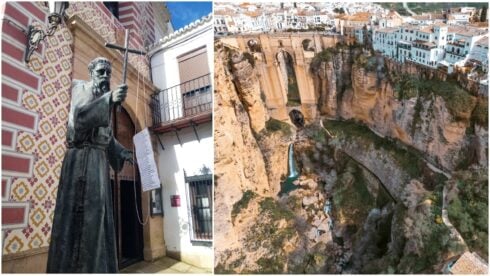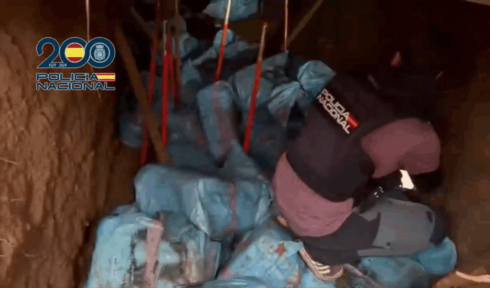The Olive Press has revealed the astonishing cases of two foreigners, a Swede and an American, who have had their Costa del Sol properties stolen from them using forged power of attorney documents created in South America.
These twin cases highlight a disturbing and growing international fraud network targeting foreign homeowners in Spain, using fake legal documents created thousands of kilometres away and inexplicably accepted by notaries and land registrars in Spain.
ELIZABETH, an American citizen and long-term resident in Spain, purchased her €2.5 million five-bedroom villa in 2012.
Her dream was to set up a peaceful yoga retreat on the Costa del Sol. But in August 2023, while she was attending a retreat in Indonesia, that dream turned into a nightmare.
“I woke up at five in the morning to my phone ringing off the hook,” she recalls. Her house-sitting friend had just experienced a violent break-in.
A group of men entered the villa, smashing through doors and disabling alarms. They claimed they had a valid rental contract and were acting under the authority of the new ‘owner’.
“I hadn’t sold the house. I hadn’t even thought of it,” Elizabeth explained to the Olive Press this month. “I was thousands of miles away.”
When police arrived, the intruders presented documents and an ID card – not of Elizabeth, but of a Mexican woman named ‘Rosa Elvia’.
Thankfully the police were sceptical and sent them away with two of the men later arrested for breaking into the same home.
But it has done anything but calm Elizabeth’s nerves as she still continues to solve the horrific issue which means she can neither move, nor sell the property.
Elizabeth has since tried to trace Rosa’s identity and believes she doesn’t exist. The passport and documents presented, she claims, were entirely fabricated.
The roots of the fraud go back to 2018, according to Elizabeth’s lawyer, Carmen Herrera, based in Fuengirola.
That year, a forged power of attorney (POA) was created in Mexico. It included a fake passport for Elizabeth, identifying her as a Colombian national living in Mexico City.
With that fraudulent POA, a fake private purchase contract was drawn up and signed by a notary in Mexico, then apostilled – giving it an air of international legality.
The forged documents sat dormant until July 2023, when they were used to register the supposed sale at a land registry office in Marbella.
“On the day I supposedly sold my home, I was flying to London,” Elizabeth said. “I never saw a cent.”
Even more shocking, she says, is that no one in the Spanish legal system bothered to verify her identity.
“You can Google me. I’m American. I live in Spain. I’ve never even been to Colombia,” she said. “How could the registrar accept this without checking?”
According to Spanish property law, a notary must verify the authenticity of any POA used in a property transaction. If the POA comes from outside Spain, it must have a ‘Hague Apostille’ or equivalent legalisation.
But according to the Olive Press’ regular property columnist Mark Stucklin, something clearly went wrong.
“In this case, it must have been a crooked or negligent notary who didn’t do proper due diligence,” Stucklin said. “There’s no reason these documents should have been accepted without scrutiny.”
Elizabeth’s lawyer Herrera agrees. Talking exclusively to the Olive Press this week, she explained: “They didn’t do their job properly. The notary, the registrar – someone let this through, and that failure enabled a crime.”
When Elizabeth emailed the Mexican notary listed on the sale, they claimed to know nothing about it. She even looked up the buyer’s listed address in Mexico City.
“It was a barrio of tin-roofed homes,” she said. “These aren’t even real houses. How could someone from there afford a luxury villa in Marbella?”
Once the fraudulent sale was registered, the criminals moved quickly. Just a month later, they attempted to physically take possession of Elizabeth’s home.
“They’ve sent young men with no legal residency to break in, intimidate, and harass anyone inside,” Herrera said.
Electrical systems were burned out, alarms disabled, and neighbours frightened. Two of the intruders have already been sentenced to prison for breaking and entering.
The police have intervened, and the courts have granted Elizabeth a precautionary measure preventing further sale or transfer of the property until the case is resolved. But her home remains at risk.
“I’m scared. I can’t pay the bills, I can’t fix the damage. The house is falling apart,” Elizabeth told the Olive Press.
“It’s constantly devaluing. I feel trapped. After this, I will never buy property in Spain again.”
Her case eerily follows that of Sara, a Swedish environmental consultant featured on The Olive Press front page last month.
Her Mijas apartment was stolen using a forged Colombian POA and men – posing as victims of fraud – showed up at her door, tried to evict her, and even contacted her building’s community administrator to falsely claim ownership.
“They acted innocent, like they didn’t understand what was going on,” Sara said. “They even tried to convince my neighbours they were the real victims.”
Property lawyer Diego Echavarria, of Fairway Lawyers, in Marbella, said the use of forged legal documents is becoming more common, particularly with AI making forgeries more realistic and easier to produce.
He said he has heard of at least three, while estate agent Adam Neale, of Terra Meridiana, in Estepona, said he had heard of another multi-million fraud of a plot in Sotogrande.
“It’s very easy now to create something that looks official,” explained Echavarria. “Notaries can be fooled – but they should still verify carefully.
Antonio Flores, another lawyer on the Costa del Sol at Lawbrid, offered a clear warning: “If someone walks in off the street with a foreign POA and wants to sell a home, a notary should treat that with extreme suspicion. This can happen to any homeowner.”
The European Union is currently rolling out a new system requiring public documents to include a QR code for instant authenticity checks.
But it’s not fully operational across all member states, and these latest cases prove that current safeguards aren’t enough.
“We need to know who is responsible for letting this fraud happen,” Elizabeth asked this week. “Was it the notary in Mexico? The registrar in Marbella? Who failed to check even the most basic information?”
As authorities investigate and court proceedings continue, Elizabeth and Sara are left in legal limbo – two victims among what may be many more, in a system vulnerable to exploitation.
And as this international crime wave spreads, one thing is clear – unless the legal infrastructure for property transactions is reformed, and quickly, Spain’s reputation as a safe place to buy a home could be at serious risk.
Click here to read more News from The Olive Press.








